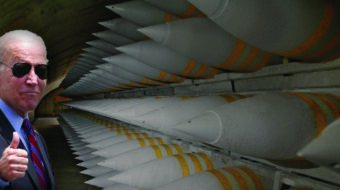“I profess that minimum wage be eliminated and we operate on the laws of supply and demand just like we did before the depression.”
That statement was made by John Raese, the billionaire businessman who is running for Senate in West Virginia where the minimum wage is the federally mandated $7.25 per hour.
A look at races across the country shows that many Republicans are attacking a concept Americans have long held sacred – the federal minimum wage.
The new wave of pro-business Republicans running for office is willing to do what Republicans, only a few years ago, wouldn’t have dreamed of trying. A minimum wage hike passed the Senate 94-3 in 2007, with only three Republicans against.
Some states, like Alaska, with a minimum wage of $7.75 an hour, have a minimum wage that is higher than the federal wage, but not if that state’s GOP Senate candidate gets his way.
Alaska Republican Joe Miller argues that the federal government lacks the constitutional authority to impose a federal minimum wage.
Rand Paul, the Kentucky Republican Senate candidate says, “It’s not a question of whether the federal government can or cannot (set a minimum wage). I think that’s decided. I think the question you have to ask is whether or not when you set the minimum wage it may cause unemployment.”
Connecticut has a minimum wage of $8.25.
Linda McMahon, the wealthy former CEO of World Wrestling Entertainment and Republican candidate for Senate in Connecticut said last week that she thinks people have been helped by the minimum wage but that it should, perhaps, be lower than it is.
“The minimum wage now in our country, I think we’ve set that and a lot of people have benefited from it in our country, but I think we ought to review how much it ought to be, and whether or not we ought to have increases in the minimum wage.”
Extremist Republicans wouldn’t stop at just rolling back minimum wages. They also want to get government out of the health care business.
Paul in Kentucky, who is running against Democrat Jack Conway, told a business gathering Oct. 4 that “Medicaid has turned into welfare” and that the program should be “temporary until people can help themselves. Too many people are receiving Medicaid who don’t really need it,” Paul said.
The conservative candidates actually seek to eliminate every government rule that protects either public health or the environment.
“This idea that government has to do something is not a good idea,” said Sen. Jim DeMint (R-S.C.). “The less we do, the better except maybe to dismantle some of the federal programs that are making it harder for America to be competitive.”
Writing for Change.org Oct. 4, Jesse Leber noted, “If this Republican vision were to come true the agency most emasculated would be the Environmental Protection Agency, which by the nature of its expansive oversight task – to protect our air, water and land, which otherwise polluters would destroy without recourse – tends to issue the most regulations of any federal agency.”
And, it’s not just Senate candidates that progressives are worried about.
Michael Cooper, in a New York Times article Oct. 4, warned that Republicans running for governor in a few states could block one of President Obama’s signature initiatives: a new passenger rail system and the nation’s first bullet train service.
In Wisconsin, Scott Walker, the GOP candidate for governor, has said he would kill a high speed rail project for which the state received $800 million in stimulus funds.
In Ohio, the GOP candidate for governor, John Kasich, is vowing to kill a stimulus project to link Cleveland, Columbus and Cincinatti by rail.
The country’s biggest high-speed rail project, California’s $45 billion plan to connect San Francisco and Los Angeles with 220 mile-per-hour trains, could be killed if the Republican, Meg Whitman were elected. She has said that, given the financial crisis, the program is “unaffordable.”












Comments